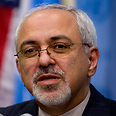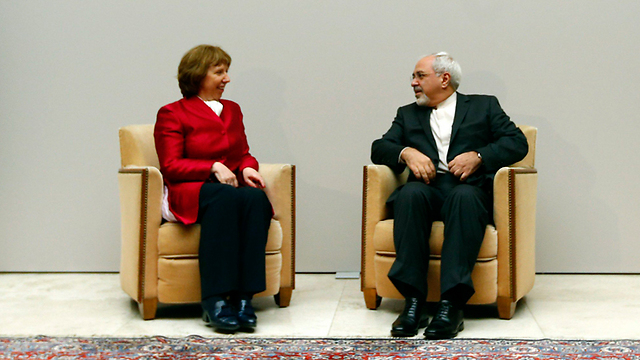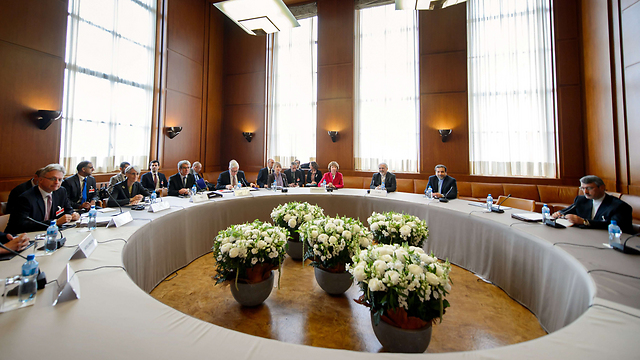
Report: US offers Iran deal allowing uranium enrichment
Telegraph reports deal aims to freeze Iran's nuclear program for six months, give breathing space for negotiations. In return for freeze, US would ease sanctions. Iran's FM Zarif: Believe agreement can be reached by Friday
America has proposed a short-term nuclear agreement with Iran at a meeting in Geneva which would allow Tehran to continue enriching uranium at low levels, according to an aide briefed on the talks, the British Telegraph reported Thursday.
The goal is to freeze Iran’s nuclear program for perhaps six months in order to create a breathing space for a comprehensive agreement to be negotiated.
Related stories:
- Iran: Nuclear plan 'backed' by 6 world powers
- US: 6-month freeze for Iran's nuclear program
- Iran's Rohani not 'optimistic' about nuclear talks
Earlier Thursday, Prime Minister Benjamin Netanyahu warned that any deal which failed to stop Iran from enriching uranium would be a “mistake of historic proportions”.
Jay Carney at the White House
Iranian Foreign Minister Zarif (Photo: AFP, VIOLAINE MARTIN)
Ashton and Zarif (Photo: Reuters)
Western diplomats and US officials have refused to disclose any details of a "first step agreement," but a Senate aide, citing briefings from the White House, the State Department and sources in Geneva, told the Telegraph he understood that it would include four key points:
1. Iran would stop enriching uranium to the 20% level that is close to weapons-grade – and turn its existing stockpile of this material into harmless oxide.
2. Iran would continue enrichment to the 3.5% purity needed for nuclear power stations – but agree to limit the number of centrifuges being used for this purpose. There would, however, be no requirement to remove or disable any other centrifuges.
3. Iran would agree not to activate its plutonium reactor at Arak, which could provide another route to a nuclear weapons-capability, during the six-month period. Iran may, however, continue working on the facility.
4. Iran would agree not to use its more advanced IR-2 centrifuges, which can enrich uranium between three and five times faster than the older model.
In return, the US would ease economic sanctions, possibly by releasing some Iranian foreign exchange reserves currently held in frozen accounts. In addition, some restrictions affecting Iran’s petrochemical, motor and precious metals industries could be relaxed.
However, a senior administration official made clear that only “reversible” sanctions would be eased - and they could be re-imposed if Iran were to break any deal.
Edging toward agreement
Hopes of reaching a “first step” agreement of some kind were rising yesterday, with one Western diplomat in Geneva describing the talks as “lengthy, constructive and substantial”.
Iranian Foreign Minister Mohammad Javad Zarif told journalists that the “talks went well”, adding: “I’m hopeful that we can move forward. We are making progress, but it’s tough.”
Nuclear talks in Geneva (Photo: AFP)
Zarif said it was possible that an agreement could be reached at thiemeeting, which is expected to conclude on Friday.
However, an interim deal along the lines set out above would alarm Israel and Congressional hawks in Washington.
David Albright, the director of the Institute for Science and International Security, a think tank which monitors Iran’s nuclear ambitions, told the Telegraph that if Iran stopped enrichment to 20% purity and converted its existing stockpile, it would be "nowhere near enough" he . Any interim agreement would be also undermined if Iran was still able to manufacture centrifuges, including the old IR-1s and the more advanced IR-2Ms.
If so, Iran could then "emerge if the deal fell apart with several thousands IR-1s and IR-2Ms to be deployed rapidly in Natanz, and possibly even a third centrifuge plant," Albright noted, adding: "I think it is quite reasonable to ask Iran to stop centrifuge manufacturing, but I’m not sure the US is going to go there."
The Senate source gave warning that the deal as currently outlined "would neither freeze nor setback" the time Iran would need to “breakout” to make a nuclear weapon.
"Since Iran could advance its program to a point of undetectable breakout during the six-month confidence building period, the Senate will have to act immediately to protect America’s national security – and that means imposing further sanctions on Iran," he said.
Congress is currently considering tough new sanctions on Iran. The White House has successfully lobbied for these to be put on hold pending the outcome of the Geneva talks.
A senior administration official said that further punishment of Iran’s economy could wreck the prospect of a settlement. "If there is only a 10% chance that additional sanctions would put at risk those negotiations – and quite frankly, we believe it’s higher than 10% – we all have an obligation not to take the risk," said the official.
- Receive Ynetnews updates directly to your desktop













